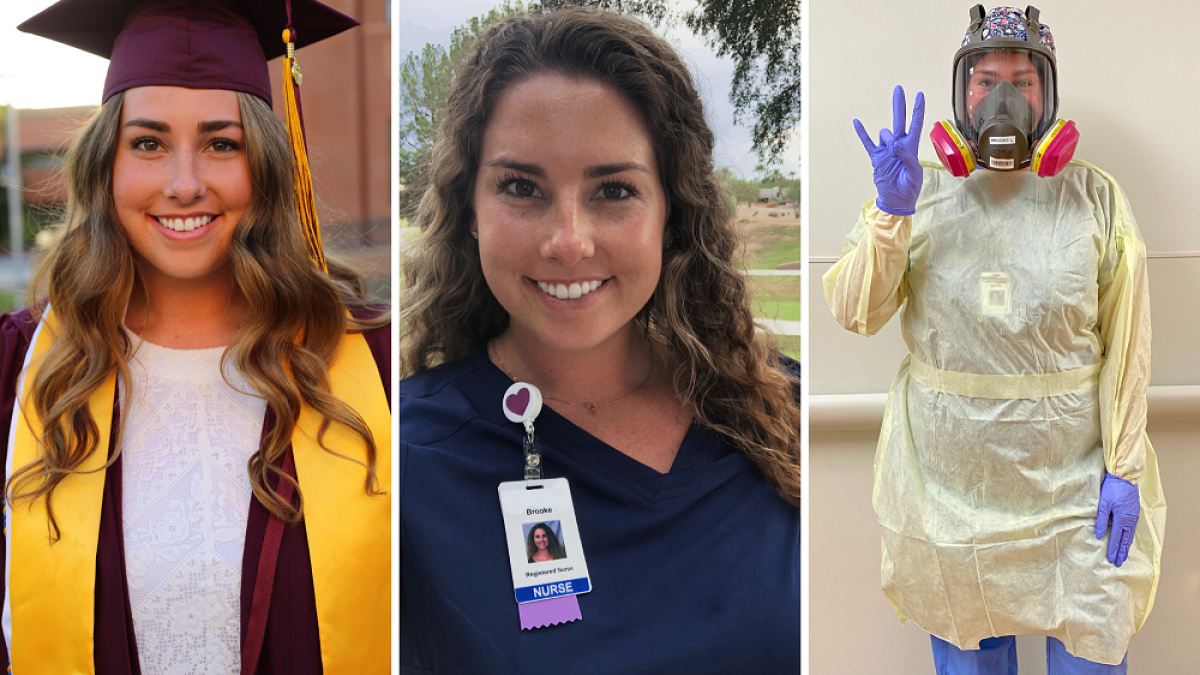A season of transitions brings perspective and confidence for 2019 alumna

Brooke LaVelle pictured in her cap and gown, then after starting her first job as a nurse and more recently in full personal protective equipment.
Time spent in nursing school is full of transitions. You have your transition into the professional program, to different specialties, and then there’s the transition to practice which is meant to prepare you for your first job as an RN.
Brooke LaVelle progressed through each step successfully. She graduated from ASU’s Edson College of Nursing and Health Innovation in May 2019, earning a Bachelor of Science in Nursing.
“As a result of my Term 7 and Term 8 clinicals, I was able to network while in school so that I had a job lined up post-graduation, at the same facility I did rotations in,” LaVelle said.
The future looked especially promising.
She started in the progressive care unit in September at a Scottsdale area hospital, with the goal of transitioning to the intensive care unit relatively quickly. LaVelle jumped enthusiastically into her new job ready to deliver exceptional care. It marked one of the biggest transitions yet into her chosen profession and sent her into a mild version of what’s commonly known in the field as “reality shock.”
"As a new grad RN, you go through an initial period which is kind of like a honeymoon phase. After working so hard in nursing school and passing the state boards, you begin your first job and everything seems like it’s going to be rainbows and unicorns from then on … and then reality sets in and you feel like maybe you’re inadequate or don’t have the right resources to succeed," she said.
The timing of this was not great. LaVelle was trying to navigate this new, strange feeling of inadequacy as the first cases of a new, highly contagious virus were beginning to spread overseas.
She knew she couldn’t sit in that feeling for long and worked toward pulling herself out by focusing on what she was doing well and how to build on those skills. In the areas she was struggling, it was about tapping the resources available to her, doing more research and seeking more education.
“That was a big thing that helped me, along with looking in the mirror and admitting to myself I wasn’t supposed to be perfect. The reality is nursing school teaches you a lot but it does not and, truthfully, cannot teach you everything.”
All the while, LaVelle was still focused on her goal of making the transition to a role in the Intensive Care Unit. But before she could put that plan in motion the coronavirus had made its way to Arizona and the onslaught of cases quickly consumed her hospital.
“I ended up staying in my current unit and learning a whole lot more than I thought I ever would in my first year of nursing. I took extra classes and went out for certifications I otherwise wouldn’t have. I’ve gained so much knowledge by investing myself in my first job rather than just looking at it as a means to get to the next place.”
All of those efforts have paved the way for new and exciting opportunities. LaVelle is now serving as a preceptor for nursing students and joined Edson College’s Alumni Board.
At the same time, working through her insecurities as a new nurse during a global pandemic only reinforced the humbling impact that nurses have on their patient’s lives.
“We are our patient’s lifeline. They’re not able to have visitors come into the hospital, we’re the face they see from sunup to sundown every day. Whether you’re a nursing student, recent alumni or you’ve been in the field for 25 years, as nurses, we have this awesome responsibility and privilege. I do think that’s something to be mindful of.”
Her first year as a nurse may not have gone according to plan but LaVelle is enjoying the detour and optimistic about the future.
“As much as I do feel bad for all of us new nurses since we never really knew what it was like before the pandemic, in some ways, it is an advantage because it can only go up from here.”